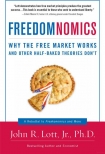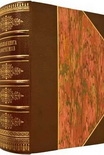Freedomnomics: Why the Free Market Works and Other Half-Baked Theories Don't John Jr. (the dot read aloud .txt) 📖

- Author: John Jr.
Book online «Freedomnomics: Why the Free Market Works and Other Half-Baked Theories Don't John Jr. (the dot read aloud .txt) 📖». Author John Jr.
1.What body can try impeachments of the president of the United States?
2. Check the applicable definition for responsibility: ___ a duty, ___ a speech, ___ a failure
3. Name the attorney general of the United States.
4. May women now serve on juries in Alabama State courts?
5. If a person charged with treason denies his guilt, how many persons must testify against him before he can be convicted?
6. At what time of day on January 20 each four years does the term of the president of the United States end?
7. If the president does not wish to sign a bill, how many days is he allowed in which to return it to Congress for reconsideration?
8. If a bill is passed by Congress and the President refuses to sign it and does not send it back to Congress in session within the specified period of time, is the bill defeated or does it become law?
The answers in order: 1. The Senate; 2. a duty; 3. Nicholas Katzenbach; 4. Yes; 5. two; 6. 12 noon; 7. ten; 8. it becomes law unless Congress adjourns before the expiration of 10 days. The number of correct answers required to pass the test was left up to each county election board. See http://www.crmvet.org/info/litques.htm.
30 See Lott and Kenny, “Did Women’s Suffrage Change the Size and Scope of Government?” For an interesting discussion on literacy test voting requirements in North and South America, see Stanley Engerman and Kenneth Sokoloff, “The Evolution of Suffrage Institutions in the New World,” National Bureau of Economic Research working paper 8512.
31 Literacy tests became less effective over time, reducing turnout by only 1 percentage point by 1960. See John Filer, Lawrence Kenny, and Rebecca Morton, “Voting Laws, Education Policies, and Minority Turnout,” Journal of Law and Economics, October 1991, 383.
32 Scott Farmelant, “Dead Men Can Vote: Vote Fraud is Alive and Well in Philadelphia,” Philadelphia City Paper, October 12-19, 1995.
33 Ibid., and Mark Fazlollah, “Workers Apparently Broke Residency Rules,” Philadelphia Inquirer, May 17, 1995.
34 Jingle Davis, “Even death can’t stop some voters,” Atlanta Journal and Constitution, November 6, 2000.
35 Jim Boulet Jr., “Commission Creation,” National Review, February 26, 2002.
36 Deborah M. Phillips, Testimony on Election Issues, Senate Rules and Administration, March 14, 2001.
37 Tim Collie, “Florida’s Flawed Election Process,” Sun-Sentinel (Fort Lauderdale, Florida), December 10, 2000.
38 John Fund, Stealing Elections (San Francisco: Encounter Books, 2004), 62-64. Nearly a third of jurisdictions in Missouri have more registered voters than people. See Bill Lambrecht and Virginia Young, “U.S. Sues Missouri over Voter Lists,” St. Louis Post Dispatch, November 23, 2005. See also Jeremy Hagen, “Photo IDs protect one-person, one-vote ideal,” Springfield News-Leader (Missouri), April 5, 2006, and “Inflated voter rolls complicate election turnout percentages,” Fairbanks Daily News-Miner, October 4, 2005.
39 John Fund interviewed on the Dennis Prager radio show on November 8, 2006, first hour (http://boss.streamos.com/download/Townhall/audio/mp3/7d23b263-65b5-4c19-9ac8-67ebd7cdc3f6.mp3?siteid=PodCast).
40 Editorial, “Voter Suppression in Missouri,” New York Times, August 10, 2006.
41 Chuck McCutcheon, “Absentee Voting Fosters Trickery, Trend’s Foes Say,” Times-Picayune, October 24, 2006.
42 Fund, Stealing Elections, 44.
43 John Fund, “Absent Without Leave,” OpinionJournal.com, October 30, 2006 (http://www.opinionjournal.com/diary/?id=110009167).
44 Rick Montgomery, “Questions abound in voter push,” Kansas City Star, October 12, 2006, and Jeff Douglas, “Voter Registration Fraud Alleged in St. Louis,” Kansas City Star, October 11, 2006.
45 Both these measures were supported by the bipartisan Carter-Baker Commission on election reform. Such rules are also supported by an overwhelming majority of Americans. A survey by Rasmussen Research indicated that 82 percent of all Americans, including 75 percent of Democrats, agree with the statement that “people should be required to show a driver’s license or some other form of photo ID before they are allowed to vote.” See Fund, Stealing Elections, 5.
46 Deroy Murdock, “Cleaning up America’s Election System,” Scripps Howard News Service, September 28, 2006.
47 David Lieb, “Missouri Voter ID Law Latest in National Test Cases,” Associated Press, August 20, 2006 (http://www.belleville.com/mld/belleville/news/state/15320528.htm) and “Supreme Court Allows Arizona Voter ID Law,” Reuters News Wire, October 20, 2006 (http://www.washingtonpost.com/wpdyn/content/article/2006/10/20/AR2006102001203.html).
48 “Mexican Senate approves mail-in absentee ballots for Mexicans living abroad,” Associated Press, April 28, 2005 (http://www.azcentral.com/specials/special03/articles/0428mexicovote-ON.html). Absentee ballots are the source of fraud in many different countries. The United Kingdom also faced claims of widespread vote fraud from “postal votes” during the 2005 parliamentary election. See Zoe Hughes, “Reform call after postal votes row,” The Journal (Newcastle, UK), May 21, 2005.
49 Curiously, however, the election reforms resulted in only a trivial increase in voting rates for Mexican congressional elections. Comparing the four congressional elections prior to the reforms with the four afterward produces only a one percent increase, from 56 to 57 percent. For the turnout data up through the 2003 elections see Joseph L Klesner., “The Not-So-New Electoral Landscape in Mexico,” Working Paper, Department of Political Science, Kenyon College, September 15-16, 2003.
50 John R. Lott, Jr., “Evidence of Voter Fraud and the Impact that Regulations to Reduce Fraud Have on Voter Participation Rates,” SUNY Binghamton Working Paper, July 29, 2006.
51 Provisional ballots allow people to vote even if their names do not appear on voter rolls, while no excuse absentee ballots allow any registered voter to receive an absentee ballot without having to provide a reason for needing one.
52 John R. Lott, Jr., “Evidence of Voter Fraud and the Impact that Regulations to Reduce Frand have on Voter Participation Rates,” SUNY Binghamton Working Paper, July 29, 2006.
53 “Vote Fraud, Intimidation, and Suppression in the 2004 Presidential Election,” American Center for Voting Rights Legislative Fund, Washington, D.C., August 2, 2005. If there is another report, I haven’t been able to find it.
54 John R. Lott, Jr.,





Comments (0)